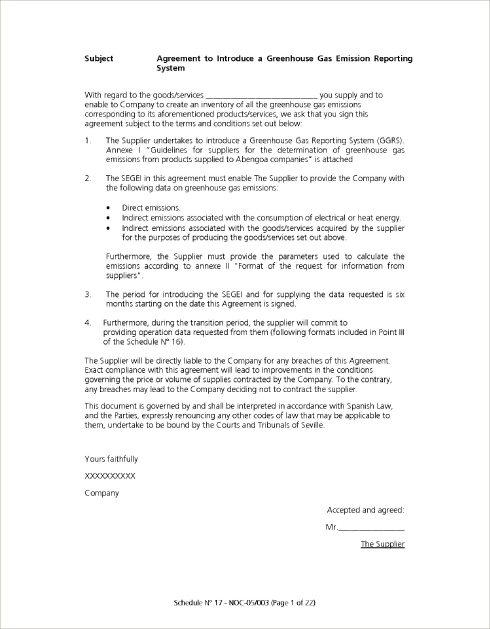 Abengoa
Abengoa
Annual Report 2010
- Corporate Social Responsibility Report
- Abengoa and its Suppliers
- Social Responsibility Code for Suppliers
To ensure the integrity of those parties that could have an influence on company activities, Abengoa requires that its suppliers sign up to the Social Responsibility Code (SRC) for Suppliers and Subcontractors, which includes eleven clauses based on the principles of the United Nations Global Compact2 and inspired by the international SA80003 standard.
Since June 2008, Abengoa requires that its suppliers, including providers of raw material, sign up to this code as a way of promoting adherence to and compliance with social and environmental regulations, encompassing all company productive processes and ensuring greater transparency in both company and third-party operations through a commitment to establishing a mutually beneficial relationship with company suppliers.

In 2009, suppliers signed a total of 7,596 agreements with Abengoa companies, and in 2010 the figure totaled 3,872. This represents a total of 16,758 signed agreements since this measure was implemented.


The Biofuel Production Supply Chain
Rapport with suppliers of raw materials (grains and vegetable oils) is fundamental in obtaining certification of these raw material inputs and bringing about a reduction in greenhouse gas emissions.
In May of last year, Abengoa excluded a provider from the supply chain for failure to comply with the policy implemented by the company regarding social and environmental sustainability. The company consequently asked its feedstock providers to reject palm oil from any group company affected by this exclusion measure.
Abengoa seeks assurance of the sustainability of all company activities. In the case of palm oil, a raw material used in producing biodiesel, employed solely at the Spanish plant in San Roque, the company requested of all suppliers that palm oil origin be both socially and environmentally sustainable based on the conditions that must be accepted and fulfilled by all suppliers in the realm of social responsibility and in controlling greenhouse gas emission levels.

The Abengoa Greenhouse Gas Emissions Inventory4, in addition to recording direct and indirect emissions of all companies that form part of the group, computes the emissions deriving from products and services acquired from third parties, including those generated in land use and agricultural practices associated with the production of raw material inputs employed in manufacturing biofuels. This led the company to refocus its purchasing policy, making it an essential requirement for all providers of goods and services to report their emissions, or to undertake in writing to establish a system for computing emissions within a given period of time.
Developing the system for computing emissions is yet a further step forward in Abengoa’s commitment to the struggle against climate change, and enables the company to quantify the emissions derived from its activity on an annual basis to thereby set targets for reduction, compensation and neutralization, and label its products and services with the corresponding CO2 emissions.
Moreover, all companies that are part of the supply chain must sign the Social Responsibility Code (SRC) through which they manifest their commitment to fulfilling all aspects of social and environmental responsibility set forth under the Global Compact of the United Nations.
The measure consisting of supplier exclusion will remain in effect until the company affected demonstrates complete fulfillment of the policy on social and environmental sustainability implemented by Abengoa.

2. One of the premises of Abengoa’s labor-related social policy is that of “promoting the principles of the Global Compact among company suppliers”. (Internal norm NOC 04).
3. Abengoa’s Labor-Related Social Responsibility Management System, in keeping with the model established under the SA8000 Standard, “involves suppliers and contractors in upholding Abengoa’s labor-related social policy by establishing procedures for evaluating and selecting said suppliers and contractors based on criteria of social responsibility, obtaining a written commitment from them to comply with established requirements and developing monitoring mechanisms for subsequent verification of compliance” (Internal norm NOC 04).
4. See chapter titled Greenhouse Gas Emissions Inventory